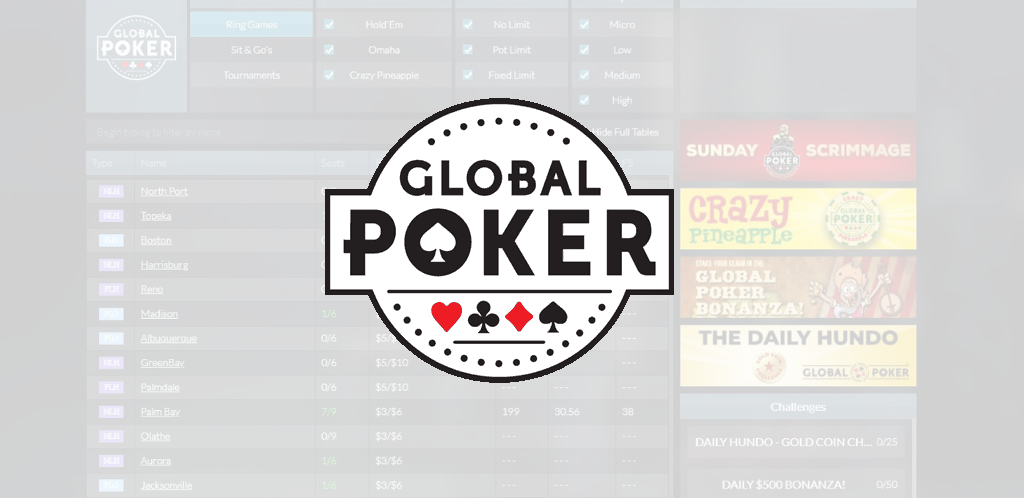New York Online Poker
Poker has long been a favorite game in New York, where poker clubs date back to the 19th century.
Today, several of the state’s commercial and tribal casinos have live poker rooms. That said, the Empire State has not legalized online poker like neighboring states New Jersey and Pennsylvania.
Lawmakers did introduce legislation in 2022 to legalize online casino gaming as well as online poker in New York. Those bills, however, did not gain much traction. Now, Assemb. Gary Pretlow has reintroduced a bill to legalize NY online poker for the 2023 session. The proposal would amend state law to redefine poker as a game of skill as opposed to gambling, which would clear the way for potential legalization.
That said, while still not legal in the Empire State, online poker players in New York do have a few options. You can travel to nearby New Jersey or Pennsylvania. You can also play at a social online poker site, such as Global Poker.
Here is an overview of the current status of poker in New York, including where it stands and what its prospects are going forward.
Is online poker legal in New York?
No, online poker is not explicitly legal in New York. Since New York law doesn’t explicitly criminalize online poker, some might assume that such an omission actually makes it legal. However, that assumption would be wrong.
Section 225.00 of the New York Penal Code clearly states a person engages in gambling when that person stakes or risks something of value upon the outcome of a contest of chance. It says any contest, game, gaming scheme or device in which the outcome depends on chance, even if the skill of the player may also be a factor, should be considered a game of chance.
Tribal and commercial casinos offer live poker rooms that host both cash games and tournaments.
Social poker in New York
 While New Yorkers cannot play legal real-money poker online, social online poker sites provide an option.
While New Yorkers cannot play legal real-money poker online, social online poker sites provide an option.
By employing a sweepstakes model and using virtual currencies rather than cash, these poker sites are able to operate in states where traditional online poker is not available. The best-known and most popular social poker site in NY is Global Poker.
Global Poker welcomes players from New York. The site uses two virtual currencies: Gold Coins and Sweeps Coins. Players can purchase Gold Coins and use them to play “cash” games and tournaments where they can win more Gold Coins.
The Gold Coins have no actual cash value. However, when players purchase Gold Coins, they sometimes receive free Sweeps Coins as part of a promotion. You can use these Sweeps Coins to play in “cash” games and to enter tournaments for which the prizes are more Sweeps Coins. Players can collect Sweeps Coins by other methods, too, such as through Facebook giveaways.
Once players have won a certain number of Sweeps Coins, they can redeem them for cash prizes that they can then withdraw.
Are offshore poker sites safe for NY players?
No. There are a number of online poker sites accepting NY players, however, they are offshore sites. Offshore poker sites present significant risks for players, and you should avoid them in favor of legal sites.
If you deposit funds and play at an offshore site, you do so without any of the protections a licensed and regulated poker site provides. Since offshore sites operate outside of New York jurisdiction, you have no legal recourse should you encounter any problems related to the security of their funds or game integrity.
If you suspect cheating, collusion, multi-accounting or other issues regarding the fairness of games on an offshore site, you have to hope the site’s security team will respond to your complaints and deal with them appropriately. But there are no guarantees, and no legal means to ensure against such issues arising.
There have even been cases where such sites have shut down without notice, leaving players suddenly unable to access their accounts. Again, if an event like this were to occur, you would have little or no chance of recovering your bankroll.
The short answer, then, of whether it is safe to play on offshore sites is no, it is not. Fully legal, licensed and regulated sites are much preferable for US players.
When will NY have legal online poker sites?
While past legislation has failed to gain support to legalize online poker in New York, that has not deterred proponents.
In January 2023, Assemb. Gary Pretlow introduced a bill to amend the state law and reclassify online poker as a game of skill as opposed to luck. Such an approach helped daily fantasy sports become legal, and it could help NY online poker cross the finish line.
New York law deems “gambling” as risking something of value on the outcome of a contest of chance, wherein an individual has no control or influence. A contest of chance includes any event in which the outcome “depends in a material degree upon an element of chance.” While some of these games may call for even a little bit of skill, the law concedes, such skill does not influence or determine the outcomes of these games.
Pretlow’s bill notes that any contest that pits the skill levels of players against each other is considered a game of skill, as ruled by New York courts. Poker, according to the proposal, has been classified as a game of skill, including in a New York federal court.
Online poker in NY has a number of supporters among the state’s lawmakers. In fact, they have been seriously discussing the possibility of legalizing online poker for many years.
Online poker legislation has been introduced in New York every single year since 2014. In 2017, the Senate even voted in favor of a bill by an overwhelming 54-8 margin before it subsequently died in a House committee.
Primary proponent Sen. Joseph Addabbo reintroduced the online poker bill again in 2020, though it once again failed to move forward. As in the past, the bill would have authorized up to 11 licenses for online poker, each good for 10 years. The state would collect 15% tax revenue, a rate similar to both New Jersey and Pennsylvania.
The bill may not have advanced up the legislative ladder, but the issue certainly remains in play. There have been new legislative proposals to legalize online poker seemingly every year. While those proposals have stalled, several lawmakers remain optimistic that NY online poker will be legalized in 2023.
Now that online sports betting in New York has become a reality, and with gaming expansion happening again in 2022 with the expedition of three downstate NY new casino licenses, there could very well be favorable conditions for the subsequent introduction of legal online poker. So, keep your eyes open for news.
Online poker options in New Jersey and Pennsylvania
As far as real money online poker options go, New York players can create accounts on legal online poker sites in New Jersey and Pennsylvania. They can even deposit funds from their New York homes. However, players must be physically within the applicable states in order to play online poker.
Online poker rooms in both New Jersey and Pennsylvania offer a great variety of cash games, sit and go’s and multitable tournaments. Most sites focus on No Limit Texas Hold’em and Pot Limit Omaha, although WSOP.com also spreads seven-card stud, and PokerStars has a variety of mixed games.
Many New York poker players routinely travel either to NJ or PA to participate in the big online tournament series that frequently run on WSOP.com and PokerStars. WSOP.com invites New Jersey players to compete for WSOP Online Circuit rings and even WSOP bracelets.
In addition, on PokerStars, players in the Garden State can play the New Jersey Spring Championship of Online Poker (NJSCOOP) and New Jersey Championship of Online Poker (NJCOOP) series, and those in Pennsylvania can play the PASCOOP and PACOOP.
Live poker in New York
There are a number of live poker rooms in New York’s casinos. Poker rooms in the tribal casinos date back to the 1990s and 2000s, while commercial casino poker is newer, opening during the latter half of the 2010s.
Here’s a quick look at the poker rooms in each of the four tribal casinos and four commercial casinos:
| Casino | Commercial/Tribal | Number of Tables |
|---|---|---|
| del Lago Resort & Casino | Commercial | 14 tables |
| Resorts World Catskills | Commercial | 19 tables |
| Rivers Casino & Resort | Commercial | 16 tables |
| Tioga Downs Casino and Resort | Commercial | 12 tables |
| Akwesasne Mohawk Casino Resort | Tribal | 5 tables |
| Seneca Niagara Casino & Hotel | Tribal | 23 tables |
| Seneca Allegany Resort & Casino | Tribal | 8 tables |
| Turning Stone Resort Casino | Tribal | 32 tables |
Also worth noting are the two commercial poker rooms at Casino Niagara (26 tables) and Fallsview Casino Resort (16 tables), both in Niagara Falls just over the border in Ontario, Canada.
Commercial vs. tribal casino poker rooms
Players must be 21 or older to play any of the games in New York’s commercial casinos, including poker. Tribal casinos, though, operate within their own jurisdictions. As a result, in some cases, the age requirement differs.
For example, the minimum age to play poker at the Akwesasne Mohawk Casino Resort, Seneca Allegany Resort & Casino and Turning Stone Resort Casino is 18 years old. Seneca Niagara Casino & Hotel, however, requires players to be at least 21 to play.
Brief history of New York poker
When it comes to underground poker, New York is home to many of the most famous clubs in America.
Books like The Thompson Street Poker Club and Queer Luck from the 1880s and 1890s chronicle such clubs and the characters who populated them, albeit in an embellished fashion.
Starting in 1919 and lasting into the early 1930s, another well-known poker club met regularly at the Algonquin Hotel in midtown Manhattan. The group consisted of actors, writers, poets, columnists and critics, and they called themselves the Thanatopsis Pleasure and Inside Straight Club. Given that members of the famed Algonquin Round Table took part, it’s no surprise there were many stories written about the games.
Such poker games weren’t technically legal, but they thrived nonetheless. New York eventually legalized other types of gambling, like pari-mutuel wagering on horse races (reinstated in 1940) and the state lottery (in 1967). Underground poker clubs remained illegal but could be found all over the five boroughs.
Many clubs met in private homes or apartments, while others set up in restaurants, bars, office buildings and sometimes even in churches. A number of clubs convened at Hungarian restaurants commonly known as “goulash joints” or “ghoulies.”
Some clubs became quite famous, such as the Mayfair Club, which started as a bridge club before introducing backgammon, gin rummy and poker. Famous players like Stu Ungar, Erik Seidel and Dan Harrington were among those who played poker at the Mayfair. Later, the writers of the 1998 film “Rounders” would draw inspiration from the Mayfair and model the fictional Chesterfield Club after it.
Such clubs began encountering significant resistance from legal authorities, particularly during the tenure of New York City Mayor Rudolph Giuliani. The Mayfair was shut down in 2000, as were other clubs. Eventually, though, other establishments arose to take their place.
Legal options for New York poker players have also emerged over the years. In 1993, the state’s first tribal casino opened: Turning Stone in Verona. Others followed, and in 2013, voters authorized an amendment allowing commercial casinos to open outside of New York City. The first of these opened a few years later.
NY’s path to legalizing online poker
As mentioned, online poker legislation has been a topic of legislative discussions in New York since 2014. At first, a few half-hearted bill submissions and discussions were all there was.
However, in 2016, a bill passed through the Senate Racing, Gaming and Wagering Committee. It marked the first time online poker legislation pushed past the introduction stage.
The NY Senate passed the bill by a vote of 53-5, and things looked promising. However, the 2016 legislative session ended in June without any action from the State Assembly.
The Senate passed similar legislation by a vote of 54-8 in June 2017. From there, online poker legislation looked like a good bet to go beyond where it had gone a year earlier. Unfortunately, like its predecessor, the bill never made it past the Assembly’s Standing Committee on Racing and Wagering.
The next two years, 2018 and 2019, proved to be quite frustrating for fans of online poker games. Although the demise of PASPA in 2018 was a boon for state legislatures and sports betting, it may have had a negative effect on the prospects for online poker in New York. Since the profit and tax potential for sports betting is so much higher than for online poker, many lawmakers made it clear that online sports betting would happen before online poker had a chance.
Another court ruling further wounded the prospects of online poker in New York. The online poker bills filed by State Sens. John Bonacic and, later, Joe Addabbo both relied upon the argument that poker was predominantly a skill game. However, a state court ruled that the skill argument was invalid for daily fantasy sports, and created a precedent that would apply to online poker, too. In 2020, a state appellate court upheld the lower court’s finding.
Between the blossoming of sports betting and the legal challenges, New York’s 2018 online poker bills died uneventful deaths without floor votes. Because sports betting became the en vogue topic, refiled bills didn’t even have the same level of momentum in 2019 or 2020.
However, New Yorkers who want online poker can take solace in the fact that they do have some steadfast champions in the legislature. In addition to Addabbo, who took up the torch after Bonacic retired in 2019, State Assemblymen Gary Pretlow and Clyde Vanel have also acted positively toward online poker legislation.
With that said, the end of 2020 seemed to put online sports betting in the spotlight, as Gov. Andrew Cuomo reversed his stance and endorsed the practice. At this point, online poker fans should hope that online sports betting can become a reality and let lawmakers see the potential of allowing the online poker games to begin.






